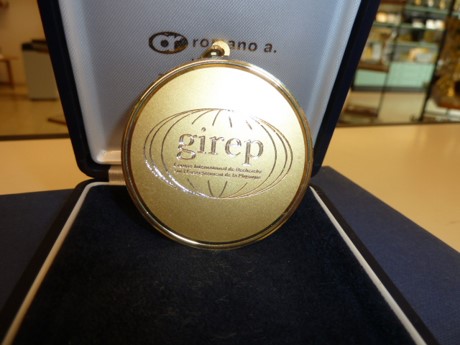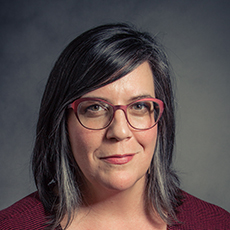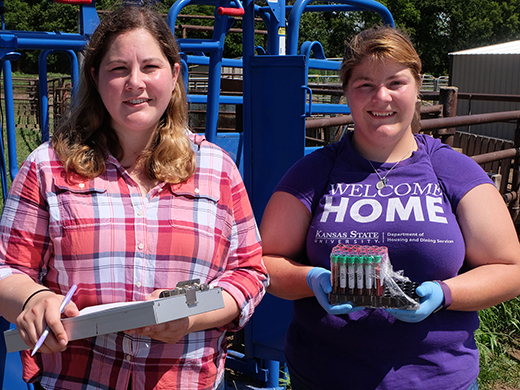07/17/19
K-State Current - July 17, 2019
K-State Current is a weekly news update for the Kansas Board of Regents to apprise the Regents on a few of the many successes and achievements made by K-State faculty, staff and students. 
K-State News
A top asset: Kansas State University is best educational value in state for fifth year in a row Kansas State University graduates continue to earn the highest average starting salary among new college graduates in Kansas, helping the university top a national study of the best educational values in the state for the fifth year in a row.
Kansas State University graduates continue to earn the highest average starting salary among new college graduates in Kansas, helping the university top a national study of the best educational values in the state for the fifth year in a row.
The study by SmartAsset, a financial technology company, determined the best educational values based on tuition, living costs, average scholarships and grants, starting salary upon graduation and retention rates at 10 schools in Kansas, with Kansas State University coming in first.
The study found that new Kansas State University graduates are earning the highest average starting salary: $51,600, which is up $1,600 from last year's state-leading starting salary of $50,000. The university also is best in student retention at 84 percent.
"A Kansas State University education is a terrific investment that pays off, as this survey shows," said Emily Lehning, interim vice provost for enrollment management. "Not only do our graduates land jobs at a high rate — our most recent survey showed 96 percent of K-State graduates are working or continuing their education after they receive their degree — but they also are earning higher paychecks because of their K-State education."
The SmartAsset survey shows just how valuable a college education is and how a Kansas State University education offers outstanding value, Lehning said.
"Studies show that college graduates earn, on average, $1 million more than high school graduates over their lifetimes," Lehning said. "When you invest in a K-State education, we invest in you. We award more than $248 million in financial aid annually, including $38 million in scholarships and awards, and we offer more than 250 majors and options — taught by award-winning faculty — so you can find the career you want."
Other Kansas schools surveyed included Baker University, Emporia State University, Fort Hays State University, MidAmerica Nazarene University, Pittsburg State University, Southwestern College, University of Kansas, Washburn University and Wichita State University.
K-State Faculty Highlights
K-State professor receives international award for lasting contributions to physics education
 Dr. Dean Zollman, Kansas State University Distinguished Professor emeritus of physics, received the 2019 GIREP Medal from the International Group on Research in Physics Education "for significant and durable contributions, at all levels, to the physics education community."
Dr. Dean Zollman, Kansas State University Distinguished Professor emeritus of physics, received the 2019 GIREP Medal from the International Group on Research in Physics Education "for significant and durable contributions, at all levels, to the physics education community."
GIREP, which stands for Groupe International de Recherche sur l'Enseignement de la Physique, (International Group on Physics Education Research) bestows the medal annually to one person. Dr. Marisa Michelini, president of GIREP and a professor at the University of Udine in Italy, presented the award to Dr. Zollman on July 2 during GIREP's 2019 conference in Budapest, Hungary.
"GIREP can count on Professor Zollman's help in any circumstances," Dr. Michelini said. "He has an open mind and is generous, very active, and competent in his support to the goals of GIREP and its members."
She also noted that Dr. Zollman has been invited 14 times since 1984 to give presentions at GIREP conferences and has served on eight GIREP advisory boards. He has conducted workshops and made presentations at 46 other international conferences. She also credited Dr. Zollman with being a co-founder, with Prof. Ton Ellermeijer of Amsterdam, of the World Conference on Physics Education, which will meet in Hanoi next year.
In addition to being a keynote speaker at the GIREP conference in Budapest, Dr. Zollman's international activities this year include conducting a workshop for gifted high school students in Italy and teaching a three-week course at Jilin University in China.
 "I am honored and humbled to receive the GIREP Medal," Dr. Zollman said. "This group has worked diligently to improve physics education, and I am proud to be a part of it."
"I am honored and humbled to receive the GIREP Medal," Dr. Zollman said. "This group has worked diligently to improve physics education, and I am proud to be a part of it."
Dr. Zollman has been a faculty member at Kansas State for more than 40 years. His major awards include the National Science Foundation Director's Award for Distinguished Teacher Scholars (2004), the Carnegie Foundation for the Advancement of Teaching Doctoral University Professor of the Year (1996), and American Association of Physics Teachers' Robert A. Millikan Medal (1995). His present research concentrates on the teaching and learning of physics and on science teacher preparation. At K-State he was named University Distnguished Teaching Scholar in 1996 and University Distinguished Professor in 2001.
Founded in 1966, GIREP is an international membership organization centered in Europe. It is open to individuals with a concern for improving the teaching of physics. The members, who come from over 80 countries, include secondary and university faculty, physics education researchers, and curriculum developers. The GIREP Medal was established in 1995.
Katie Kingery-Page honored with professional award for K-State's Meadow
 Katie Kingery-Page, associate professor of landscape architecture and incoming associate dean for the College of Architecture, Planning & Design, or APDesign, was awarded the prestigious Professional Merit Award from the Central States Region of the American Society of Landscape Architects for her design and stewardship of the Meadow project.
Katie Kingery-Page, associate professor of landscape architecture and incoming associate dean for the College of Architecture, Planning & Design, or APDesign, was awarded the prestigious Professional Merit Award from the Central States Region of the American Society of Landscape Architects for her design and stewardship of the Meadow project.
The Meadow, a three-quarter-acre mini-park near the Marianna Kistler Beach Museum of Art on K-State's Manhattan campus, is the subject of the award for built work and community stewardship. The Central States region of the American Society of Landscape Architects encompasses North Dakota, South Dakota, Nebraska, Iowa, Kansas, Missouri, Oklahoma and Arkansas. The community stewardship award honors achievements made within a Central States community that are relevant to landscape architecture and have made an impact socially, economically, or environmentally.
As project director, Kingery-Page led the design and construction, as well as on-going maintenance and interpretation of the Meadow. Additionally, she co-led a grant funding initiative to support the project. The Meadow showcases nearly 40 native plant species of the Flint Hills tallgrass prairie ecoregion; demonstrates sustainable, low-water, chemical-free landscape that fosters pollinator insects; a natural laboratory for a variety of both graduate and undergraduate research projects; serves as an experiential component for museum tours, and an extension of the work of museum educators to make meaningful connections among art, science and enjoyment of the natural world. The Meadow's broadest goal is to raise awareness of the plight of grasslands worldwide: 45% have been destroyed, and only 4% are protected.
 The Meadow is a community-built project: all site-furnishings and planting on the site have been created by APDesign and Beach Museum of Art faculty, staff, students and community volunteers. Ecologically, the Meadow team was most concerned with increasing bio-diversity on site, using as little herbicide and potable water as possible, and creating habitat and forage for insect pollinators. Because the Meadow is positioned to receive runoff from large areas of concrete, it also helps manage stormwater by slowing water, allowing more infiltration, and increasing evapotranspiration.
The Meadow is a community-built project: all site-furnishings and planting on the site have been created by APDesign and Beach Museum of Art faculty, staff, students and community volunteers. Ecologically, the Meadow team was most concerned with increasing bio-diversity on site, using as little herbicide and potable water as possible, and creating habitat and forage for insect pollinators. Because the Meadow is positioned to receive runoff from large areas of concrete, it also helps manage stormwater by slowing water, allowing more infiltration, and increasing evapotranspiration.
Although the award focuses on the role of the landscape architect in a successful project, "The Community Stewardship award for the Meadow would not be possible without a broad network of campus and community members," Kingery-Page said.
Kingery-Page acknowledges the many partners and contributors, including K-State's Division of Facilities, Konza Prairie Biological Station, College of Arts and Sciences, Carl R. Ice College of Engineering and College of Agriculture.
Since its establishment, faculty members in many colleges have used the Meadow as a living lab. Community partners have included a broad network of volunteers from Boy Scouts of America, Riley County Master Gardeners, Friends of the Beach Museum, Manhattan Area Arts and Humanities Coalition, Change the World, Friends of the Konza Prairie, and the Kansas Native Plant Society.
Beach Museum director Linda Duke, along with museum staff members Lindsay Smith and Kathrine Schlageck, played key roles in bringing the Meadow from vision to reality. Former faculty member of horticulture Rhonda Janke advised the project and contributed greenhouse space to grow some of the Meadow's plants. Recently retired members of K-State facilities staff, Mark Taussig, Dede Brokesh and Joseph Myers, also were integral in planning and installing the Meadow.
Troy Britt, 2014 graduate in art; Zak Ratajczak, 2015 graduate in biology; Caleb Melchior, 2014 landscape architecture and regional & community planning graduate; and Riccardo Prudenti, 2018 landscape architecture and regional & community planning, all took student leadership roles in establishing the Meadow. Funding for the Meadow project comes from the Hummel family in memory of Professor William C. Hummel and Sara T. Hummel; the John and John T. Henley Meadow Maintenance Fund, established by Fred and Judith Henley; the K-State Green Action Fund; and an EPA Green Infrastructure Demonstration Grant.
K-State Student News
Civil engineering senior wins national ASCE scholarship
 Angie Mitchell, senior in civil engineering from Keosauqua, Iowa, has been awarded the 2019 Eugene C. Figg Jr. Civil Engineering Scholarship from the American Society of Civil Engineers, or ASCE.
Angie Mitchell, senior in civil engineering from Keosauqua, Iowa, has been awarded the 2019 Eugene C. Figg Jr. Civil Engineering Scholarship from the American Society of Civil Engineers, or ASCE.
Created by the employees of the Figg Engineering Group, Tallahassee, Florida, the scholarship fund was established in 2002 as a memorial to Eugene C. Figg Jr., a fellow and design awardee of ASCE. Figg had dedicated his career, his company and his life to "creating bridges as art."
The scholarship is presented annually to one undergraduate civil engineering student for junior or senior year tuition expenses and fees. Its purpose is to further the education of a worthy student interested in bridge design and construction. Mitchell will receive $3,000.
Scott Schiff, teaching professor in the civil engineering department and ASCE student chapter adviser, served as Mitchell's mentor in her application and pursuit of the award.
Mitchell is the department's first national ASCE scholarship awardee since 2011.
Veterinary student selected for new research fellowship

Kansas State University College of Veterinary Medicine assistant professor Katie Reif, left, mentors second-year veterinary student Sarah Krueger on a summer research project about anaplasmosis, a cattle disease that is spread by ticks.
Sarah Krueger, Lebo, a second-year veterinary student at Kansas State University, is one of 10 students selected nationally for a Veterinary Student Research Fellowship to Address Global Challenges in Food and Agriculture.
The Foundation for Food and Agriculture Research, in partnership with the Association of American Veterinary Medical Colleges, launched the Veterinary Fellows Program to encourage veterinary scientists to explore and better understand the complexities of animal production, improve animal welfare and enhance human health.
Krueger's research project is about anaplasmosis, considered to be the most prevalent tick-transmitted disease in cattle worldwide. She is assessing whether the lone star tick, the most common tick found on cattle, contributes to the spread and development of anaplasmosis. Her research could inform disease management and treatment strategies. Krueger's research mentor is Kathryn Reif, assistant professor in the College of Veterinary Medicine.
Krueger and Reif were paired by Kansas State University's Veterinary Research Scholars Program, a summer program that provides veterinary students with in-depth, hands-on research opportunities with experienced faculty mentors. The program's goal is to motivate students toward a research-focused career.
"We are honored to be part of the Foundation for Food and Agriculture Research's inaugural fellowship year and for their investment in Sarah as she and Dr. Reif conduct this valuable research to benefit our global and local agriculture," said Kate KuKanich, Veterinary Research Scholars Program director.
"I am grateful for the opportunity to expand upon my knowledge of research and production medicine as a member of the Veterinary Research Scholars Program with Dr. Reif this summer," Krueger said. "It is exciting and rewarding to conduct research on and potentially have a positive impact in the management of a disease that is currently affecting many of our beef producers in Kansas and the United States. The support we have received from the Foundation for Food and Agriculture Research is a testament to the importance of the work we are conducting this summer. I am extremely grateful for their support of our research and the education of veterinary scientists."
"Sarah's project will help address whether lone star ticks contribute to the transmission of anaplasmosis, a disease that limits profitable beef production in the U.S.," Reif said. "This project has allowed Sarah the opportunity to gain experience in clinical disease monitoring, molecular diagnostic techniques, pathogen surveillance and tick transmission experiments — a portfolio of transferable skillsets that can be used to study other diseases of agricultural importance."
Reif said Krueger has shown herself to be highly motivated.
"She is driven to tackle her respective project, but is also maximizing her summer research experience by contributing to other ongoing anaplasmosis projects," Reif said. "We are very grateful to the Foundation for Food and Agriculture Research Veterinary Fellows Program for supporting this opportunity for Sarah and this research area."
Organizers of the fellowship program said veterinary medicine is critical to addressing global challenges related to food security, economic well-being and public health. The fellowship creates opportunities for veterinary students to pursue research related to global food security and sustainable animal production.
"The Foundation for Food and Agriculture Research Vet Fellows program provides mentorship and experience that prepares rising stars in veterinary science for public service and scientific careers," said Sally Rockey, executive director of Foundation for Food and Agriculture Research. "The first cohort of Vet Fellows is conducting bold research in previously underfunded areas of veterinarian science that help farmers combat pests, disease and antimicrobial resistance."
The three-month long fellowship allows up to 10 students annually to conduct research with a mentor. The fellowship culminates with student presentations at the annual National Veterinary Scholars Symposium in late July/early August. This year the symposium will be hosted by the Cummings School of Veterinary Medicine at Tufts University.